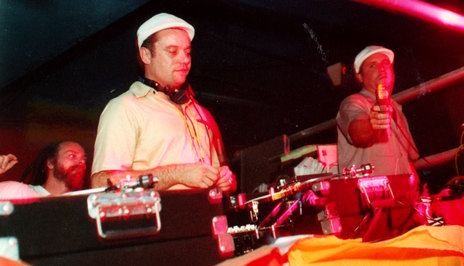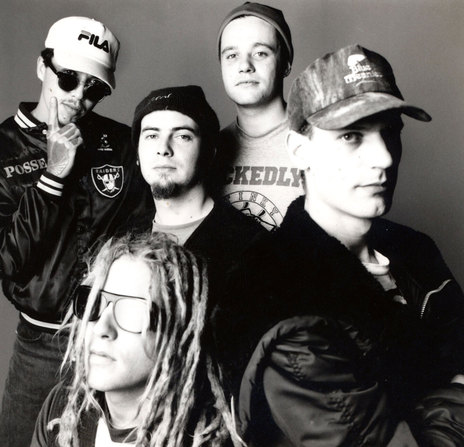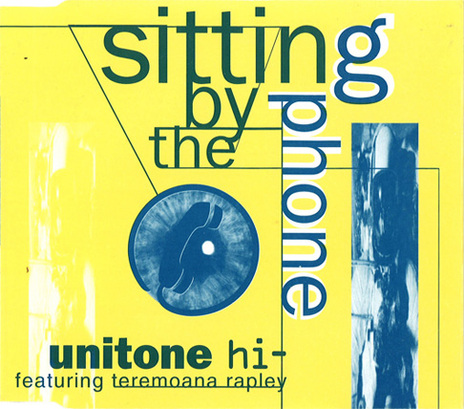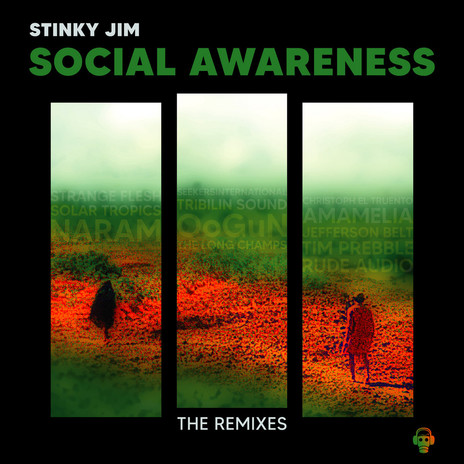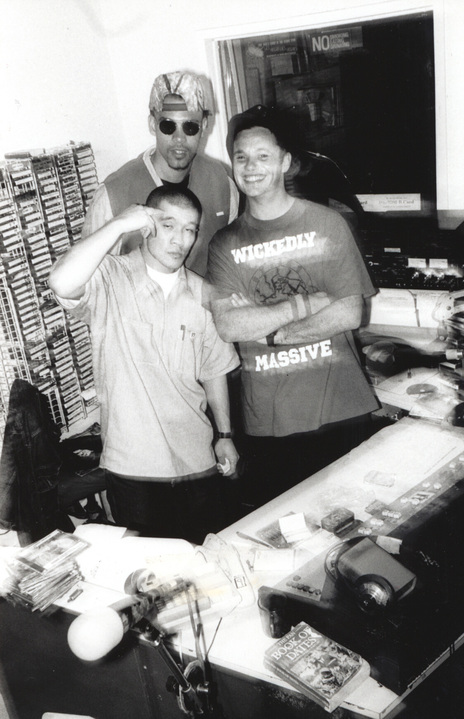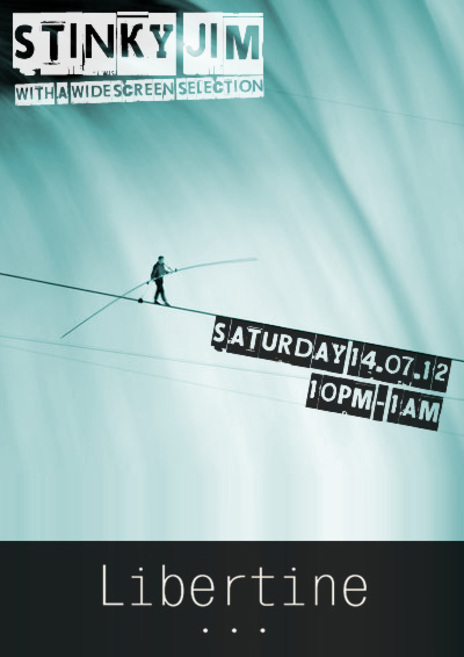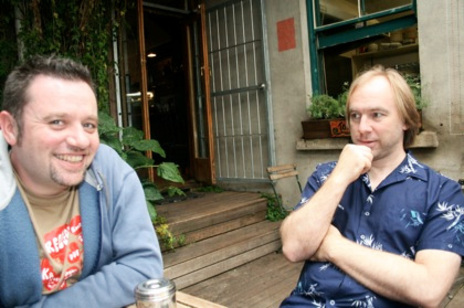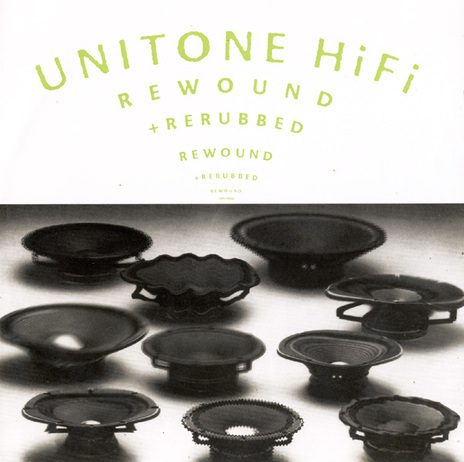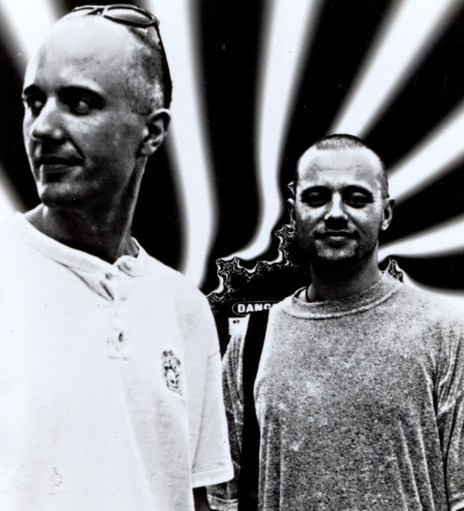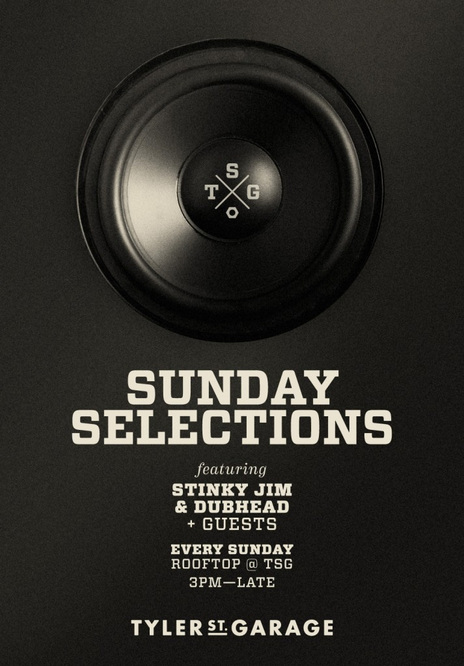The band then toured these records throughout Europe, headlining and pulling substantial crowds in places where no New Zealand bands had ever been. In 1996, New Zealand electronic acts just didn’t do these things.
In the second decade of the 21st Century, Stinky Jim, or Jim Pinckney (the name on his passport), is no less of an enigma – albeit arguably New Zealand’s highest profile and musically influential enigma. His voice, words and music can be found on Auckland’s 95bFM (where they have been for over two decades) and, until 2015, in the NZ Listener (where he was a regular music columnist). He is the owner of the small but hugely important record label Round Trip Mars and proffers up a steady and regular stream of anticipated mixtapes via his blog. He also DJs regularly in his spare time, and is known for his brutal – often refreshingly so – honesty, shared seemingly without regard for established protocol or correctness.
Born and raised in the English town of Leamington Spa in Warwickshire, Stinky Jim first arrived in New Zealand in 1988 after extended spells in both Indonesia and Australia, without any long term plan to reside in the country. Having spent a large part of his life to date travelling the globe, he intended to spend a brief time in the country, but ended up staying a year or so, working at the collapsing Record Warehouse store in Auckland and witnessing what he calls, with perhaps some tact, “the last days of Rome”.
Eventually heading back home to the UK, he reflected, “New Zealand’s a nice place – full of mad, crazy people, can’t wait to go back and visit but I could never live there.” After a year or so back in the UK, personal circumstances forced a rethink, and Jim returned to Auckland. “I had no intention of ever coming back, it just happened, but I knew that there were big gaps in what was going on here, and one was dancehall … I saw this opportunity in a way, plus I loved bFM. It was radio like no other in the world – I loved doing shows and that was part of the pull to bring me back here.”
Stinky Jim almost immediately found himself with his own two-hour evening show, Stinky Grooves.
During his first spell in Auckland, Jim found his way onto the 95bFM airwaves several times, including – perhaps surprisingly, given his oft-perceived associations with dub, reggae, electronic music and similar – a few shows on the long-standing alt-country show Border Radio with his friend and the show’s host, Grant McCallum. It all made sense to the then temporary resident. “That was the time they were bringing out Townes Van Zandt and other people who I adored …”
The slightly chaotic uniqueness of student radio in New Zealand has found many fans over the years. In this case it was a primary reason why this soon to be important name on our airwaves found himself more permanently in the country, where he would play a strong role in moulding the sounds we make and listen to. It was a perfect synergy – New Zealand offered Stinky Jim a vehicle and in return he opened stylistic doors in his new home.
In New Zealand for the second time, Stinky Jim almost immediately found himself with his own two-hour bFM evening show, Stinky Grooves, which quickly became one of the station’s must-listen slots and has lasted over two decades, doing pretty much what it began doing in 1990.
Reluctant to accept the term "tastemaker", Jim’s show has been just that since its inception, with a playlist that swings widely across a musical spectrum defined only by what Stinky Jim thinks you might want to hear. “I like to coerce people into somewhere they didn’t expect to be musically … it’s not about us, it’s about the door we open.”
He told Russell Baillie at the NZ Herald in 1998, "You tease them with something they know, then slap them around with something that completely does their head in, something that's special."
Playing interesting music to people who wanted to listen and who appreciated it was satisfying (and for many that would be enough), but inevitably led to the desire to create his own music – although not for the first time. “Before I came to New Zealand I’d been making this bizarre country-dub stuff. Happily, it’s a genre that’s never been taken on – and [those early recordings] are never going to come out!”
From the beginning, the dubby, organic Pacifican grooves they were making broke substantially fresh artistic ground.
“But I’d made nothing really of worth until I came to New Zealand and met Joost [Langeveld] and Eddie [Chambers] and they asked me to come into the studio to provide samples for their band Nemesis Dub Systems … and I just fell in with that crowd, the NRA [Not Really Anything] folks.”
From there evolved Unitone HiFi, a loose and still ongoing artistic formation centered around Stinky Jim and Langeveld, and one that has at times also included both Angus McNaughton and Eddie Chambers. Although it was formed in Auckland, Langeveld moved to New York shortly after the group had kicked off. Jim recalls “I can’t believe it now, but we carried it all on with faxes and DATs.”
Unitone HiFi broke new ground. From the beginning, the dubby, organic Pacifican grooves they were making broke substantially fresh artistic ground, and in retrospect they were one of a small group that led the charge for reggae-infused electronic music, a uniquely New Zealand stylistic form that resounds today probably more than it ever has. But more than that, they managed to sell that sound and the music they were creating, to the world – something that was almost unheard of in the early 1990s.
By 1990 a number of Flying Nun Records and other rock bands were finding international release with some regularity, but our more rhythmic and electronic styles were mostly trapped in New Zealand, with the odd foray into Australia. Unitone HiFi's leap into the unknown in the years before 1996 changed that and arguably opened the door that eventually allowed a wide range of dub and electronic styled acts to sell their music beyond our shores. They were a strong pointer to audiences offshore, especially in Europe, that New Zealand was not just alternative rock or guitar-based music.
Initial releases were via indie label Deepgrooves in New Zealand, but then Germany’s Incoming! label released three Unitone HiFi albums in 1995 and 1996. Incoming! was hot at the time and Unitone HiFi were a core part of their roster.
Jim explains: “Incoming! was owned by a New Zealander, Mark Grimward who used to be at bFM, and he was the first person to ask me up to the station to do a show, in 1988. Then he moved to Germany about the same time we started the band, and he was into it. He had all these amazing artists and this crazy enthusiasm … so we had this fantastic guy who was operating in Germany who loved our music. We went on tour and we were the headlining act with all these incredible people, which felt a little ridiculous but so good.”
Unexpectedly, Unitone HiFi’s way of working internationally seemed to falter when Langeveld moved back to New Zealand in the late 90s.
"The sounds of New York were becoming part of the music we were making too – the sirens and the street noise."
– Stinky Jim
“All of our situations had changed and what had worked well in the past didn’t seem to work as well anymore," says Jim. "When I went to New York to see Joost and Eddie, we’d work everyday for a week, often until three in the morning, uninterrupted and flat out, because we knew we had a deadline … and then the sounds of New York were becoming part of the music we were making too – the sirens and the street noise. And the music too. [There were] songs that you didn’t know, and then, two days later you’ve become completely immersed in that song because it’s all around you ... It’s that whole New York thing where the current song becomes part of the psyche and infuses everything ... these things affected what we made and how we made it.”
That pervasive urban synergy, and the intensity of the way the band created music changed when Langeveld relocated home. As a result Unitone HiFi took a break around 1997, although the band has continued sporadically in the years since, mostly as a labour of passion, creating music when and if the members felt the urge, with releases on Jim’s Round Trip Mars label in 2006, 2009 and 2010. Another Unitone HiFi album is imminent, almost two decades after the first.
Jim’s next band was the duo Phase 5, who began life as Soundproof in 1997, with Angus McNaughton and Stinky Jim contributing tracks under that name to a couple of compilations before changing their name for the 1999 Space Bar vinyl-only EP, which then led to an album of the same name, released in 2000.
Quirkier and perhaps more cinematic than the Unitone HiFi releases, Phase 5 found themselves getting substantial airplay around the world. “I don’t think there’s anyone else who thinks to take a dancehall baseline and a bossa nova beat and a Hammond player from a chintzy revival band and make something that’s stupid and groovy … something that will end up being played from Radio 1 in England to the ABC in Australia,” they told Real Groove in December 2000.
However as importantly, the Space Bar EP also marked the launch of Jim’s Round Trip Mars, a boutique record label that has both survived 14 years in a tumultuous industry, and has resisted the inevitable urge to try and become a mini-major, existing without a catalogue or an A&R policy that insistently demands new "product". It’s a label that obviously and quite intentionally releases records simply because the owner thinks they are worthy of your attention. “I’ve had various points where the sensible thing would have been to be like everyone else and start chucking out stuff, start taking on people who are actually going to sell some units.”
The label’s closest brush with substantial commercial success came when Jim signed The Naked And Famous, releasing two EPs in 2008 for the internationally successful post-punksters, before parting ways to resolve what he felt was an increasingly uncomfortable and uneasy fit.
“I won’t release anything that I’m unsure about and that was part of the reason with The Naked And Famous thing – that it couldn’t carry on. I signed this band that were kinda talking revolution and, to me, they then just conformed.”
In a way, it’s old school record label stuff in a modern world.
Twenty-one releases in, the name many associate with the Round Trip Mars logo is SJD (Sean Donnelly), an artist who has been with the label since his Lost Soul Music album was released in 2001, RTM’s fourth release. The prestigious Taite Music Award for the 2012 album Elastic Wasteland was seen by many as not just a deserving award to the artist but an appropriate recognition of a record label which has stuck by an artist for over a decade and five albums, simply because the label’s owner believes the records should be released. It’s old school record label ways in a modern world. Seat of the pants stuff, driven by taste and an unabashed determination to tell the world about the resulting recordings.
In an odd way, Stinky Jim Pinckney remains an alien – an enigma – in New Zealand. He's a part of our musical landscape and has strongly influenced and changed that landscape. But his refusal to be subverted by the deep conservatism of New Zealand remains his strength. It's a strength that he shares with so much of the best music to have come out of New Zealand. And in that respect, he truly is one of our own.
